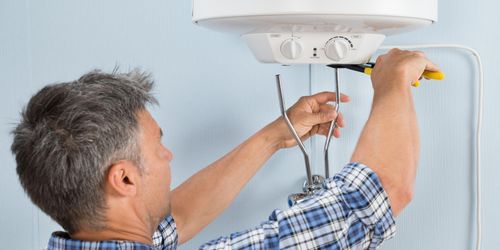Coping with the Routine Hot Water Heater Crisis Events
Coping with the Routine Hot Water Heater Crisis Events
Blog Article
What're your opinions on Is Your Water Heater Leaking??

A hot water heater is one of the most crucial basic home appliances that can be discovered in a residence. With water heaters, you don't need to experience the tension of home heating water by hand whenever there is a requirement to take a bath, do the laundry, or the meals. Nevertheless, there is always an opportunity that your hot water heater would break down as with the majority of mechanical devices.
It is very important to note any kind of little malfunction and tackle it quickly prior to points get out of hand. A lot of times, your water heater starts to malfunction when there is an accumulation of debris as a result of continuous usage. As a preventative measure, routine flushing of your water heater is advised to stop sediment build-up and also stop practical failure.
Typical water heater emergencies as well as just how to manage them
Insufficient hot water
It might be that the water heating unit can't support the warm water demand for your house. You could upgrade your water heater to one with a bigger ability.
Rising and fall water temperature.
Your hot water heater might begin producing water of different temperatures usually ice scalding or cold warm. In this situation, the first thing you do is to guarantee that the temperature level is set to the desired degree. If after doing this, the water temperature maintains changing throughout showers or other activities, you could have a malfunctioning thermostat. There might be a requirement to replace either the thermostat or the home heating system of your hot water heater.
Leaky hot water heater storage tank.
A leaking container could be a sign of corrosion. It might cause damage to the floor, wall and electrical devices around it. You might even be at danger of having your apartment flooded. In this circumstance, you ought to turn off your hot water heater, permit it to cool down, and thoroughly search for the source of the issue. Sometimes, all you need to do is to tighten up a couple of screws or pipeline connections in cases of minor leaks. Yet if this does not work and also the leakage continues, you may need to utilize the services of a specialist for an ideal replacement.
Discolored or stinky water
When this happens, you require to recognize if the issue is from the water or the tank resource. If there is no amusing odor when you run cold water, then you are particular that it is your water heating system that is faulty. The stinky water can be created by corrosion or the accumulation of microorganisms or debris in the water heater storage tank.
Verdict
Some home owners disregard little caution and also minor faults in their hot water heater unit. This only brings about further damages and also a feasible full malfunction of your appliance. You need to handle your hot water heater faults as soon as they come near stay clear of more costs and unneeded emergency difficulties.
With water heaters, you do not require to go through the stress of home heating water by hand every time there is a requirement to take a bathroom, do the laundry, or the dishes. It might be that the water heating unit can't sustain the warm water need for your home. Your water heating unit could start creating water of different temperatures typically ice cold or scalding hot. If there is no funny odor when you run cold water, then you are certain that it is your water heater that is defective. The odiferous water can be caused by rust or the buildup of microorganisms or sediments in the water heating unit storage tank.
Common Water Heater Issues and What You Should Do
What Type of Water Heater Do You Have?
Before we begin it’s first important that you identify the type of water heater you have on your property. There are two main types of water heaters out there: conventional and high efficiency.
Both of these types of products typically use either gas or electricity to heat power. There are also solar water heaters that use a thermal collector on the roof or yard to heat the water.
While these models are not as common, they can cut heating costs in half. In this article, we will focus on conventional and high efficiency.
How Do My Electric and Gas Water Heater Work?
Though they look similar, electric and gas water heaters work very differently. It’s important to know their basic function because often problems can be specific to the heating source.
In the electric model, a thermostat on the side of the machine detects the temperature of the water in the tank. When the temperature needs to rise electricity flows to a heating element suspended in the water.
Gas models also use a thermostat device — typically with a mercury sensor at the tip and an additional sensor called a thermocouple. The thermocouple detects whether the pilot light is on and controls the flow of gas.
When the thermostat drops below the appropriate level gas is released which becomes ignited by the pilot light. The flame heats the bottom of the water tank which causes hot water to rise and cold water to drop.
This natural circulation continues until the water reaches the desired temperature. Then, the thermostat triggers the gas control valve to shut off the flow of gas.
What Are the Most Common Issues and How Do You Fix Them?
https://happyhiller.com/blog/common-water-heater-issues-and-what-you-should-do/

I found that piece of writing about Is Your Water Heater Leaking? when perusing the web. Appreciated our blog? Please share it. Help someone else check it out. Thanks for going through it.
Call for expertise! Report this page